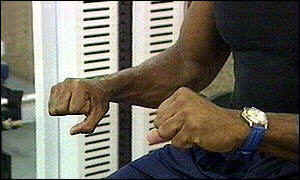| Robot Offers Hope To Stroke Patients |
|
||||
|
Stiquito Kit BattleKits Robot Toys Solar Kits Robot Arms Robosapien Basic Stamp Kits Lego MindStorms
Hobby Robots Robot Sports Electronics Mechanics Robot Minds Books for Kids Robots at Work Microcontrollers Advanced Books Used Books
Robot Motors Remote Controls Robot Parts Robot Tools Magazines Robot Videos Robot News RoboLinks Contact
|
Courtesy BBC News Stroke rehabilitation may soon be aided by robots Stroke patients could be helped to recover ability in their shoulders and upper arms by an interactive "robot therapist" which helps them to re-learn movements after paralysis. Scientists in the US have developed the robot in conjunction with engineers to speed up patients' recovery after a stroke and a study shows both early and long-term recovery are improved by its use. Neurologists worked with engineers from the Massachusetts Institute of Technology (MIT) to create the robot, which is designed to help patients regularly exercise an arm which has been paralyzed by stroke, even when they cannot move it themselves. In the study, researchers studied 20 people who had lost some or all mobility in their arm. All patients took part in a post-stroke rehabilitation program at the Burke Rehabilitation Hospital in White Plains, New York, and received additional therapy either with or without a "robot therapist". Motorized arm The "robotic therapist" sits on a desktop and has the appearance of a motorized arm. The patient is prompted by a video screen to carry out an arm exercise such as connecting dots or drawing the hands of a clock. If the movement does not happen, the robots moves the patient's arm. Then, if the patient starts to move on his or her own, the robot shuts off and allows the patient's own movement to continue. Patients who had robot therapy showed significantly greater improvement in shoulder and arm movement than those with no robot therapy. In a re-evaluation of 12 of the original 20 patients three years later, doctors found all patients had improvements in movement, but those in the robot therapy group again showed more improvement than those with no robot therapy. Dr Bruce Volpe, author of the study and a neurologist at the Burke Medical Research Institute, said: "We are always searching for new ways to improve movement in people who are radically affected by stroke. "By improving movement in the shoulder and upper arm, patients can do simple things like push objects across a table, use a computer mouse or write. "When you've lost the ability to move your arm, even small improvements are a success and an important first step." A spokesman for the Stroke Association said: " Robots are already used in some of these areas and the Stroke Association is actively funding some research. "The work in this small study looks encouraging and we will be watching it carefully." Simple movements such as reaching, sweeping and support involve the shoulder and upper arm. Patients recovering from a stroke can find their physical abilities impaired from paralysis, and also suffer damage to their mental abilities and changes to their vision, speech and language. The research was published in Neurology, the journal of the American Academy of Neurology. |
||||
|
Advertise your product on RobotBooks.com Beginners Books |
Hobby Robots |
Robot Sports |
Electronics |
Mechanics |
Robot Minds |
Robot Fiction |
|||||